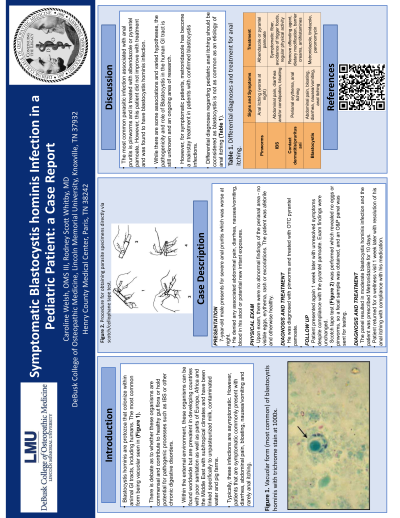Back

Clinical: General Topics
Symptomatic Blastocystis hominis infection in a pediatric patient: a case report
Friday, March 31, 2023
12:00 PM East Coast USA Time

- CW
Caroline Welsh, OMS III (she/her/hers)
Medical Student
Lincoln Memorial University Debusk College of Osteopathic Medicine
Paris, Tennessee, United States
Presenting Author(s)
Introduction: Blastocystis hominis can be found worldwide but is more prevalent in areas with poor sanitation and water quality as it is spread fecal orally. This case is unique in that the patient presented solely with anal itching and was found to have a moderate amount of this organism in his stool. This case and its unusual outcome contributes to current literature as there is not much research around this protozoa and its effect on its hosts. It is known that infections are commonly asymptomatic, so this case provides another example of infection in a symptomatic pediatric patient.
Case Study: A 7 year old male presented to the clinic with a primary complaint of severe anal itching which was worse at night. He denied any diarrhea, abdominal pain or blood in his stool. He was clinically diagnosed with pinworms and treated with over the counter pyrantel due to the expense of albendazole. The patient presented again 1 week later with persistence of the anal itching. A scotch tape test was performed and no pinworm eggs were identified with microscopy, so an O&P sample was obtained and sent for testing. The panel came back positive for moderate blastocystis hominis infection and the patient was treated with Metronidazole. He returned a week later for an annual wellness visit and reported near complete resolution of the anal itching after 3 doses of the medication. An alternate explanation to this outcome could be that the patient had a self-resolving process that coincided with this treatment but we think it it likely to be attributed to the blastocystis due to the chronicity of his symptoms.
Discussion: This case provokes thought of the differentials of anal itching. Blastocystis hominis is not usually high on the list initially but is worth considering when other tests are negative and symptoms persist. Osteopathically, this case reinforces the tenet of the body as a unit. With all of its interworking parts, the gut is a vital organ and host to many organisms. If this balance is disturbed, disturbances present such as abdominal pain, nausea/vomiting, diarrhea or even anal itching. This protozoa, when infectious, is associated with dysregulated bowel function and is treated with metronidazole to restore balance to gut flora. Other cases have mostly presented with abdominal pain and diarrhea so this case provides another look into the less common symptoms associated with this infection.
Case Study: A 7 year old male presented to the clinic with a primary complaint of severe anal itching which was worse at night. He denied any diarrhea, abdominal pain or blood in his stool. He was clinically diagnosed with pinworms and treated with over the counter pyrantel due to the expense of albendazole. The patient presented again 1 week later with persistence of the anal itching. A scotch tape test was performed and no pinworm eggs were identified with microscopy, so an O&P sample was obtained and sent for testing. The panel came back positive for moderate blastocystis hominis infection and the patient was treated with Metronidazole. He returned a week later for an annual wellness visit and reported near complete resolution of the anal itching after 3 doses of the medication. An alternate explanation to this outcome could be that the patient had a self-resolving process that coincided with this treatment but we think it it likely to be attributed to the blastocystis due to the chronicity of his symptoms.
Discussion: This case provokes thought of the differentials of anal itching. Blastocystis hominis is not usually high on the list initially but is worth considering when other tests are negative and symptoms persist. Osteopathically, this case reinforces the tenet of the body as a unit. With all of its interworking parts, the gut is a vital organ and host to many organisms. If this balance is disturbed, disturbances present such as abdominal pain, nausea/vomiting, diarrhea or even anal itching. This protozoa, when infectious, is associated with dysregulated bowel function and is treated with metronidazole to restore balance to gut flora. Other cases have mostly presented with abdominal pain and diarrhea so this case provides another look into the less common symptoms associated with this infection.
